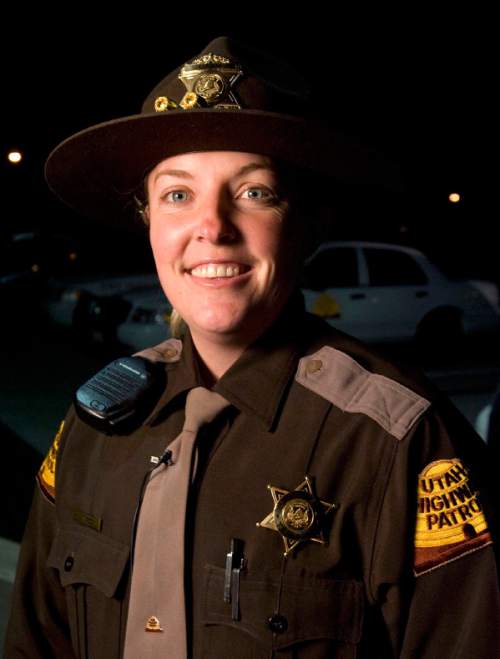This is an archived article that was published on sltrib.com in 2015, and information in the article may be outdated. It is provided only for personal research purposes and may not be reprinted.
Farmington • A judge should allow a civil complaint filed against a former state trooper and the Utah Highway Patrol to go forward as a class action lawsuit because the hundreds — maybe thousands — of DUI cases initiated by the officer were based on false statements and dishonest practices, an attorney argued Monday.
The proposed class action suit was filed in December 2012 on behalf of Utahns who claim to have been stopped for minor traffic violations and then wrongly arrested for driving under the influence of drug or alcohol by former Utah Highway Patrol Cpl. Lisa Steed and other unnamed troopers.
"She had an arsenal of dishonest conduct," attorney Robert Sykes told 2nd District Court Judge Michael Allphin on Monday.
Named "Trooper of the Year" in 2007, Steed was fired by UHP in 2012 after two criminal court judges found she had lied in court. That raised questions about Steed's actions in many of the estimated 1,000 DUI arrests she had made since being hired by the state in 2002.
Attorneys for Steed and UHP have denied the allegations in court filings. The state also contends that each case that challenges Steed's actions and arrest practices must be considered individually, because each case has its own unique circumstances.
"What if there was probable cause or reasonable suspicion in any one of those?" Assistant Utah Attorney General Meb Anderson, who represents Steed, asked the court. "Those are legal questions only this court can answer."
Allphin took the matter under advisement and said he would issue a written ruling. It wasn't immediately clear when that could come, although after the hearing, attorneys said it could take several months.
Steed was not present in court Monday.
The lawsuit has three named plaintiffs: Robert C. Anderson, Thomas Romero and Julie Tapia. Each was arrested and prosecuted for alleged DUI violations, even though tests on each were either negative for drugs, metabolites and alcohol, or showed levels of substances that were below legal limits, court papers state.
Sykes wants the court to allow Steed's cases dating back to 2006 included in the lawsuit and said Monday that he believes as many as 2,000 individuals could be named as defendants. Of the roughly 300 cases in which videotapes and written reports have been reviewed, 207 are problematic, Sykes said. For example, videos from field sobriety tests don't show the arrestee's feet as the tests are conducted, he said.
Sykes illustrated his disagreement with the state's argument against a class action certification by laying a patchwork quilt down on the courtroom floor. The quilt's many red fabric squares represent individual cases, Steed say, but each is also tied to the blanket's red border — a metaphor for Steed's approach to making DUI arrests.
"It's all the same … that's Lisa Steed," he said, adding later, "I know there are differences, there are distinctions. But they are distinctions without a difference because of the red border… It permeates everything."
Skyes also noted that as early as 2010, Steed's UHP supervisor acknowledged in an internal memo that they had concerns about a "pattern of falsehoods" on some 20 of her DUI drug arrests. That memo notes that those issues "need to be addressed before defense attorneys catch on," Sykes said.
The lawsuit alleges Steed engaged in unconstitutional and law-breaking behavior aimed at making money for the state through fines, fees and forfeitures levied on those facing false charges.
Sykes had previously said the lawsuit seeks damages that could total as much as $20 million.
On Monday, he told Allphin that for most plaintiffs, the individual damages might range between $5,000 and $20,000, depending on their circumstances. The damages would be for attorneys fees, vehicle impound fees, fines and other costs associated with their arrests and prosecutions.



